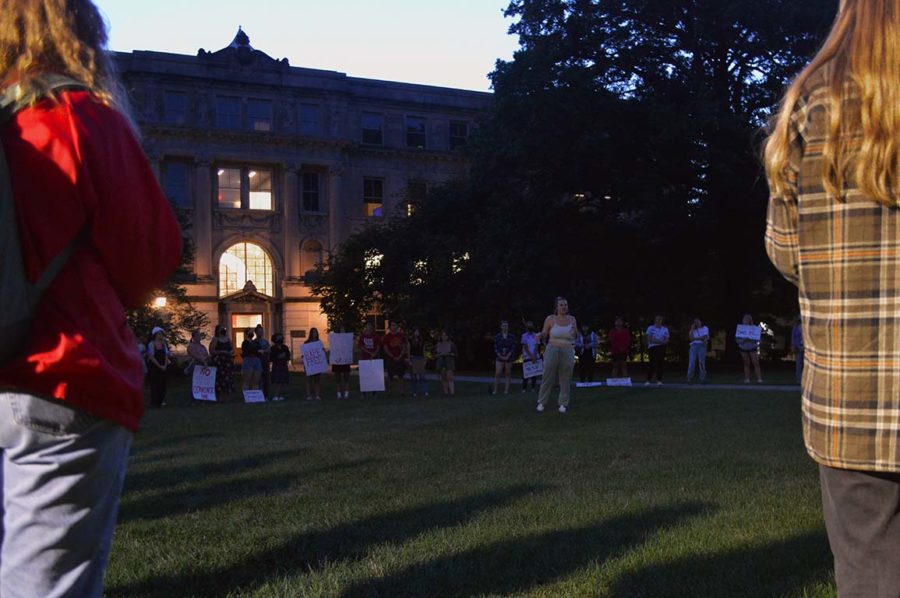Students rally to protest Title IX in its current form, joining UNL and University of Iowa
A student, supported by a circle of fellow protesters against Title IX changes, chooses to share their own experience with surviving sexual assault outside of Parks Library Wednesday night.
September 8, 2021
Content Warning: This article has mentions of sexual assault.
Editor’s note: This is the first part in a series about sexual assault on campus.
“I was a child.”
“I didn’t know it was assault until two years later.”
These are statements from students who marched across campus Wednesday night to protest Title IX changes made during the Trump presidency.
This is the first protest at Iowa State this year that is in relation to protests at the University of Iowa and the University of Nebraska-Lincoln.
“I was drunk.”
“He told me I was asking for it but I was unconscious.”
The regulations, which went into effect in August of 2020, say that “a school may address sexual harassment affecting its students or employees that falls outside Title IX’s jurisdiction in any manner the school chooses, including providing supportive measures or pursuing discipline.”
This means that there is no federal ruling, regulation or law requiring universities like Iowa State to investigate any instance of sexual assault or harassment off-campus, unless it occurs within an education program or activity.
According to the regulations, an education program or activity includes “locations, events or circumstances over which the school exercised substantial control over both the respondent and the context in which the sexual harassment occurred, and also includes any building owned or controlled by a student organization that is officially recognized by a postsecondary institution (such as a fraternity or sorority house).”
But, this doesn’t mean that Title IX always applies to sororities and fraternities.
“I lost my case because my school didn’t want to lose their top track star.”
“He said if I didn’t do it I didn’t love him.”
According to the Title IX exemptions, “Title IX does not apply to the membership practices of a social fraternity or social sorority if the active membership consists primarily of students in attendance at an institution of higher education and the fraternity or sorority is exempt from taxation under the Internal Revenue Code. 20 U.S.C. § 1681(a)(6)(A); 34 C.F.R. § 106.14(a). All other programs and activities of social fraternities and sororities are governed by Title IX if they receive any Federal financial assistance.”
The protest specifically addressed those changes pertaining to when the university is required to investigate a sexual assault.
Advocates from the Assault Care Center Extending Shelter and Support (ACCESS) also attended the protest to show support for the survivors.
“My mom told me it was my fault and I didn’t see the warning signs.”
“I was stalked and harassed by the cop who took my statement.”
Breanna Diaz, vice president of community outreach for the Multicultural Greek Council and senior studying human development and family studies, said that she attended the protest to make sure people are being held accountable.
“I feel the need to hold people in our community accountable, specifically for me just because of the Greek community,” Diaz said. “I owe that to myself and the people in my community to make sure that they’re safe.”
In addition to the perpetrators of assault, Diaz said that she wants to make sure those who allow and enable it to happen to be held accountable.
“I was seven.”
“I thought it was okay at first because he was my boyfriend.”
Scott Nguyen, senior in aerospace engineering and president of the Multicultural Greek Council, said that he showed up to the protest as a sign of support.
“[I’m here] to advocate and show support for survivors,” he said. “Especially in Greek life, like rape culture is something that fraternities continue to perpetuate so it’s important for guys to show up and like end that rape culture.”
“I feel like showing up in these spaces— not taking up too much space— but just showing up in support,” Nguyen said.
Diaz said that Iowa State needs to do more to support survivors of sexual assault.
“I know someone who was sexually assaulted my freshman year and it was by an athlete and nothing happened,” she said.
“I would like to see more transparency, for sure, with things going on we didn’t know about,” Diaz said. “And like in addition, like I said, accountability. That’s such a huge thing.”
Nguyen and Diaz said that the Multicultural Greek Council adopted a ‘no-tolerance’ policy in their constitution when it comes to sexual assault.
“Some of the other councils don’t have it,” Diaz said. “Having that put into place is something that would— I would hope that would hold people more accountable.”
“It was two years ago and I haven’t told anyone until right now.”
According to the Rape, Abuse & Incest National Network (RAINN), 13 percent of all students in higher education, both undergraduate and graduate, experience rape or sexual assault through physical force, violence or incapacitation. RAINN also cited a 2007 study on “The Red Zone,” a time when sexual assaults on college campuses are increased. “The Red Zone” falls into the months of August, September, October and November, and is when around 50 percent of all college sexual assaults occur.
Resources:
ACCESS sexual assault crisis line: 515-292-5378
Iowa State University Police Department: 515-294-4428
Ames Police Department: 515-239-5133
Iowa State University Office of Equal Opportunity: 515-294-7612
Iowa State University Dean of Students Office: 515-294-1020







